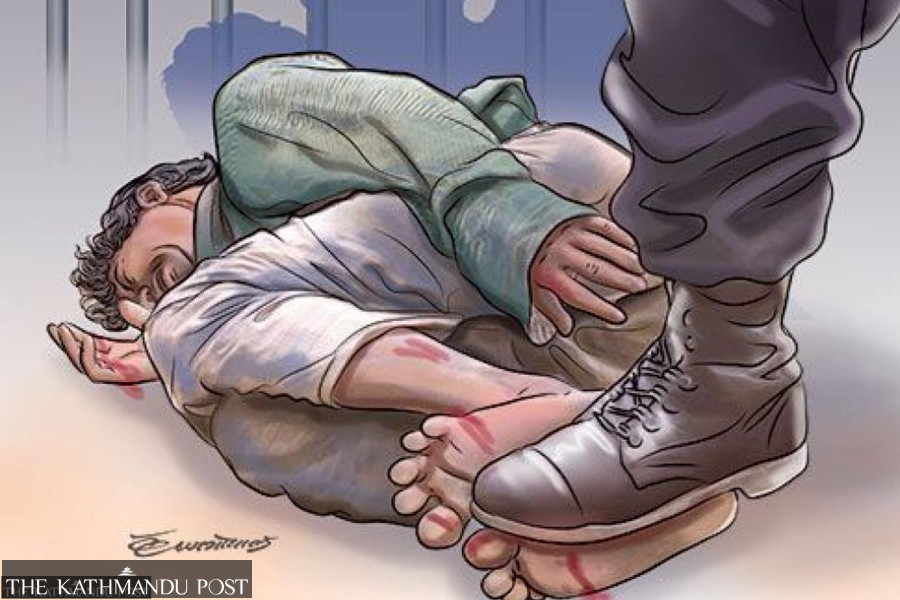National
Government dragging feet on torture perpetrators: NHRC
Torture by security forces continues in detention centres and prisons, say National Human Rights Commission and two other rights organisations.
Binod Ghimire
The National Human Rights Commission, after investigating 55 complaints of torture, recommended compensation and actions in 22 cases in the current fiscal year. While it recommended compensation for 17 victims, it asked the government to take action against 16 implicated in torture.
The government released Rs330,000 in compensation, but except for minor departmental actions against some police personnel, no criminal investigation was initiated against any perpetrator.
“The government is least interested in taking action against those responsible for torture,” Tikaram Pokharel, spokesperson at the commission, told the Post. “Our recommendations for actions are seldom implemented.”
The Constitution of Nepal has criminalised torture. No person who is arrested or detained shall be subjected to physical or mental torture or to cruel, inhuman or degrading treatment, according to Article 22. It also envisions action against the perpetrators and compensation to the victim.
The Penal Code that came into force in August 2018 has criminalised torture with the provisions of up to five years of imprisonment for the perpetrators, in addition to compensation for the victims.
Issuing a statement on the ocassion of the International Day in Support of Victims of Torture on Wednesday, the constitutional human rights watchdog said that it has been monitoring detention centres and prisons and directing the authorities to make them torture free. However, the practice of torture continues at the hands of the security forces.
Also issuing a joint statement, the Amnesty International Nepal and Advocacy Forum Nepal have raised concerns saying torture is rampant in the country even as Nepal became the party to the United Nations Convention Against Torture (UNCAT) over three decades ago. On 14 May 1991, Nepal acceded to the UNCAT and the International Covenant on Civil and Political Rights.
Even though Nepal’s National Criminal Procedure Code (Act), 2017 carries specific provisions against refusal of registering the First Information Report (FIR), victims often face the daunting task of reporting their cases to the same police station where they were tortured, according to their statement. “Consequently, the police at these stations typically fail to initiate any investigation, instead choosing to coerce victims into retracting their statements,” reads the statement adding not a single conviction has taken place in cases of torture under the law yet, demonstrating “entrenched impunity for the crime in the country and an absence of political will to bring in accountability”.
Amid the reluctance of the security agencies to investigate the perpetrators, the Supreme Court in January 2020 ordered the government to establish an independent mechanism to probe allegations of gross human rights violations perpetrated by security forces. Human rights activists and civil society organisations also have consistently raised concerns regarding lack of independent investigative mechanisms into cases of torture perpetrated by police officials. However, such a mechanism is yet to be constituted.
At least 109 cases of torture and custodial deaths have been documented by human rights organisations in various places of detention between 2018 and 2023.
“Despite measures taken by the Nepal government to criminalise torture, the lack of effective and independent mechanisms to monitor and investigate allegations of torture and custodial deaths has fostered impunity allowing the crime to fester in government detention facilities,” reads their joint statement. The organisations have claimed that their findings suggest that torture festers in every kind of detention facility in Nepal including prisons, police lockups and juvenile reforms homes, and many deaths in custody are allegedly the result of torture and lack of proper management of such facilities.
The two rights organisations have also advised the government to take urgent and comprehensive steps to end torture and deliver truth, justice and reparations to the victims and their families. They have also suggested amending the Penal Code to bring it in line with international human rights law and standards, including the removal of the existing statute of limitations on filing complaints.
Establishing an independent mechanism to monitor and investigate allegations of torture and custodial deaths and investigations of all allegations of torture and cruel, inhuman or degrading treatment under international law are among the other recommendations.
“Ensure regular and independent monitoring of all places of detention by official actors and civil society representatives,” reads the statement. “Ensure the recommendations from the National Human Rights Commission including on cases of torture are promptly and seriously implemented. Immediately implement the pending orders of the National Human Rights Commission calling for action against suspected police officers, prison and other government officials in cases of torture or other cruel, inhuman or degrading treatment and on granting compensation to victims.”




 18.12°C Kathmandu
18.12°C Kathmandu














